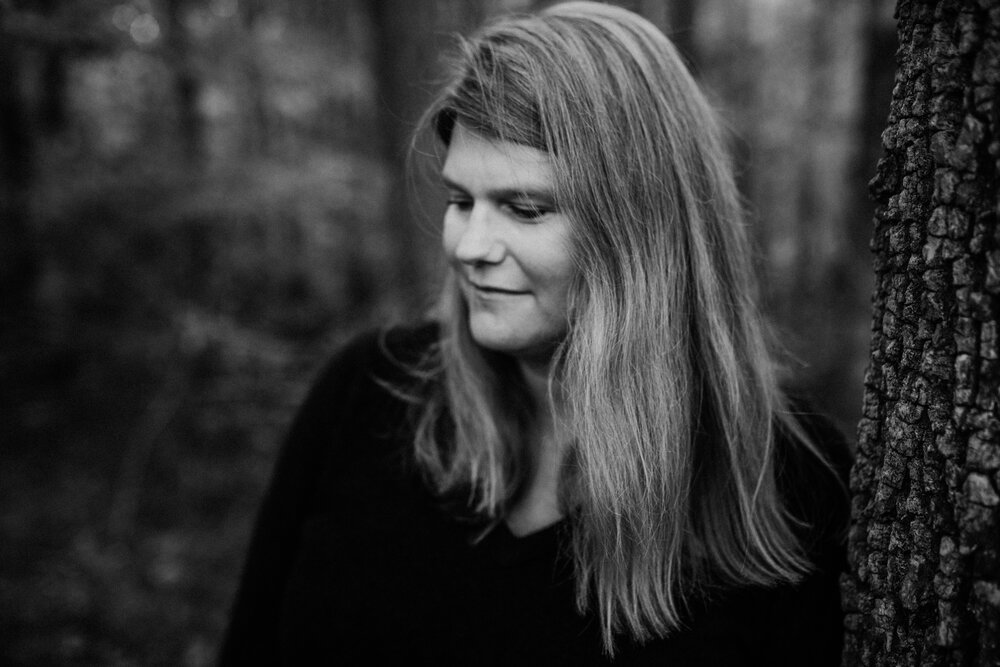“Poetry allows you to preserve a certain moment, a certain place. It’s giving voice to something that otherwise I would just carry around mutely,” says poet Annie Woodford, author of Where You Come From Is Gone and winner of the Weatherford Award for Best Books about Appalachia. “Then, when you think about economic systems or environmental issues, I think [poetry] becomes some sort of small act against that destruction or that lack of attentiveness to places. It’s a way of honoring people and places and hopefully elevating things that are not normally seen.”
Since her childhood in Henry County, Virginia, as well as the time she spent elsewhere in Appalachia, Woodford has borne witness as the places she calls home have been subjected to forces of globalization and capitalism that undermine local cultures and ecosystems. From the outsourcing of jobs from Bassett’s furniture industry to the Mountain Valley Pipeline (MVP), Woodford addresses these head-on in her poetry, balancing grief over the losses with appreciation for the places and their people.
Her poems should not be mistaken for nostalgia, though many can be read as eulogies. As one example, Woodford’s poem “In the Pipeline’s Path” is dedicated to Red Terry, a tree-sitter who lived in the canopy of a scarlet oak and maple near Bent Mountain to protest the MVP, which went into service earlier this summer despite a decade of community pushback:
She took to her tree
because she knew she’d never see
any of this again—
the wayward field,
the water meadow filled
with late spring rain
filtering down through
karst-pocked caves
to the aquifer’s hidden well.
The way southeastern trees
turkey-call against each other
when they rub high branches
in high wind.
Her poems honor people and places, but also moments of light or sound. She doesn’t romanticize—she archives. With a focus on words as documentary, cataloging that which becomes forgotten, Woodford details regional realities that seemed immutable but have nonetheless begun to vanish. In “Quiet as It’s Kept,” amid nods to concealed carry, colony collapse, and other contemporary threats, she includes the stanza:
“Things People Don’t Know the Names
of Any More”
Kudzu
Katydids
Chicken Hawks
Woodford’s landscapes ring true to those who know Appalachia, who have marveled at its red-tailed hawks and who have creek-walked for crawdads. Oaks, maples, vireos, serviceberries, pokeberries, aster, and catalpas all populate her work—yet these are not what could be called nature poems. Rather, Woodford’s attention to nature is inseparable from the generations of people living within these ecosystems.
She often writes from a place of personal embodiment, deftly probing and questioning the idea of nature as separate from ourselves in poems like “Old Christmas,” from her earlier collection, “When God Was a Child:”
Matted grass. The body flayed
open like a milkweed pod.
The body as muddy pasture.
I think I was a field once
…
A bull lived in me. He liked to sleep.
Herds of deer half darkness
wavered across me. In winter
I froze. In spring I bled wet-
weather branches. Water witching.
In addition to contemplating the personal, many of Woodford’s poems read like family scrapbooks with imperfect memories fluttering out from burst seams. In a poem titled “Ides,” she shares:
I hear my mother struggle
to breathe. She has COPD.
She smoked her first cigarette
at five years old & now holds
a vape pen tucked into her palm,
her hand bent like a saint’s
as she sips its chemical sizzle.
This is not a poem. It’s an ache.
Her mother is also a significant influence in her storytelling. “I have come to realize that my mother was a very intentional storyteller about family,” Woodford reflects. “A lot of those people are gone now, but she made sure that I heard those stories.” She adds, “I’m writing about family and stories and place, but I have really been thinking a lot about what it means to take an event or a story and write about it … Who gets to keep the stories, tell the stories, shape the stories … I’m fascinated by that.”
A related question informing her work is about who gets to enjoy the poetry and art that is made out of daily life. In addition to her writing, Woodford has taught in community colleges for years, where she is committed to sharing the written word with students. “My dad’s a plumber and I believe that even the daughters of plumbers should encounter beautiful art,” she says.
A lifelong reader, Woodford began writing poetry in fifth grade. “I actually have a very specific memory of writing a poem and really enjoying it,” she recalls. “Going out in nature and observing and then writing about it … I guess I’ve been doing that ever since. I was really lucky, I went to Patrick Henry Community College and had really great teachers. And then I went to Hollins and found poetry there.” Through her poems and her teaching, she shares in the collective work of attending to and holding space for beauty, humanity, and tenderness, even as—and especially because—the world around us seems to change more quickly than ever. Woodford’s work is a clear-eyed, meticulous, and unapologetic repository, excavating the precarities in our lives while invoking the wonderment of all that surrounds us.
